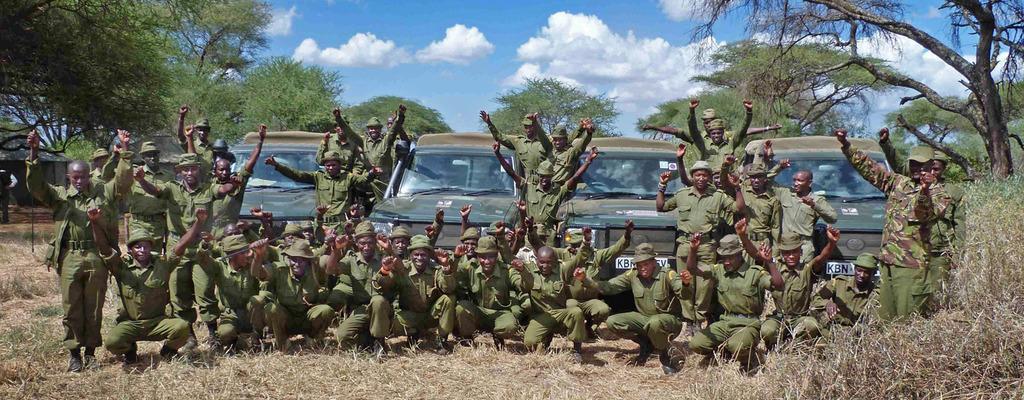
from Nick Brandt & Richard Bonham
December 30 2012
It was tragic circumstances - the killing of Qumquat and her family - that led to our appeal in November for $105,000. But as a result, we raised sufficient funds from your donations to go ahead and buy the much-needed 14 Kenyan mobile camps and new digital radio network.
This means that our ranger teams will now be able to far more effectively respond to poaching incidents in hotspots of activity. Animals’ lives will be saved, and that is completely thanks to the many of you who donated. So thank you for helping from so many thousands of miles away.
In terms of increased wildlife protection, the year also ended well with the opening of two new Big Life ranger outposts in the Amboseli-Kimana corridor, one of the most problematic areas. This was made possible by the continued generous funding by the Africa Wildlife Foundation, who have now funded six Big Life outposts in Kenya, as well as covering the ranger salaries in Tanzania. It is heartening when major organizations like AWF see just how effective and well-run our anti-poaching operations are, helping us to plug holes where further protection was still needed.
This now brings Big Life’s anti-poaching teams to 280 rangers in 23 outposts across the 2 million acres of the Kenya/Tanzania Amboseli ecosystem.
As Big Life reaches the end of its second year of existence and operations in the Amboseli ecosystem, we have seen some remarkable successes. The incidents of animals killed from poaching and human/wildlife conflict have been significantly reduced, even as the pressure of the demand for ivory, bush meat and other animal parts increases at an alarming rate.
But Christmas and the New Year in particular is a time when the Big Life teams are on high alert. There’s little time for celebration, as poachers often take advantage of the festivities as cover for their next slaughter.
True to form, Christmas Day was bleak, as it brought news that the body of an elephant, one of Amboseli’s precious matriarchs, had been found, covered with dead flies, the tell-tale evidence that she had been poisoned. Especially worrying in this instance: she would have been poisoned with something as simple as a melon or cabbage laced with poison, a farmer’s cruel attempt to protect his crops, when just a phone call to Big Life’s mobile crop raiding patrol teams could have saved both his crops and the elephant.
The death of this matriarch is now just another sad statistic. She is one of an estimated 30,000+ elephants killed at the hands of man across the African continent in 2012 (a year that will prove to be the greatest annual number dead yet.)
But here in the Amboseli ecosystem, the Big Life teams are holding the killing at bay. Over the past year, as far as we are aware, ‘only’ nineteen elephants from a population of over two thousand have been killed in the 2 million acres that Big Life covers, twelve specifically due to poaching.
However, we’ve recovered the ivory and made arrests in six of the twelve poaching cases, and in so doing, continue to send a strong message to poachers that the risks are fast outweighing the rewards.
On the Tanzanian side, when Big Life began in the region two years ago, poachers were still regularly driving into the area, gunning down large numbers of everything from giraffes to zebras for the bush meat markets in Arusha and beyond. Today, due to Big Life’s operations here, this almost never happens.
Elephant poachers from Tanzania were crossing the border into Kenya, killing elephants, and escaping back over the border with no-one to pursue them. Today, with Big Life Foundation being the only organization in East Africa with cross-border anti-poaching operations, this happens only rarely.
So at year’s end, we believe that we have a lot to be proud of, but we are in no doubt that another challenging year lies ahead. As the illegal demand for wildlife parts continues to grow - from ivory to lion parts to giraffe meat and zebra skin - there will be many who cannot resist the fast, easy profits to be made out of killing these irreplaceable creatures.
With your help, Big Life will be there - both in the Amboseli ecosystem and beyond into other areas - to allow the animals to flourish in peace once again.
Please donate today at :
And thank you again for all your support over these last two years....
A Happy New Year,
Nick Brandt & Richard Bonham
